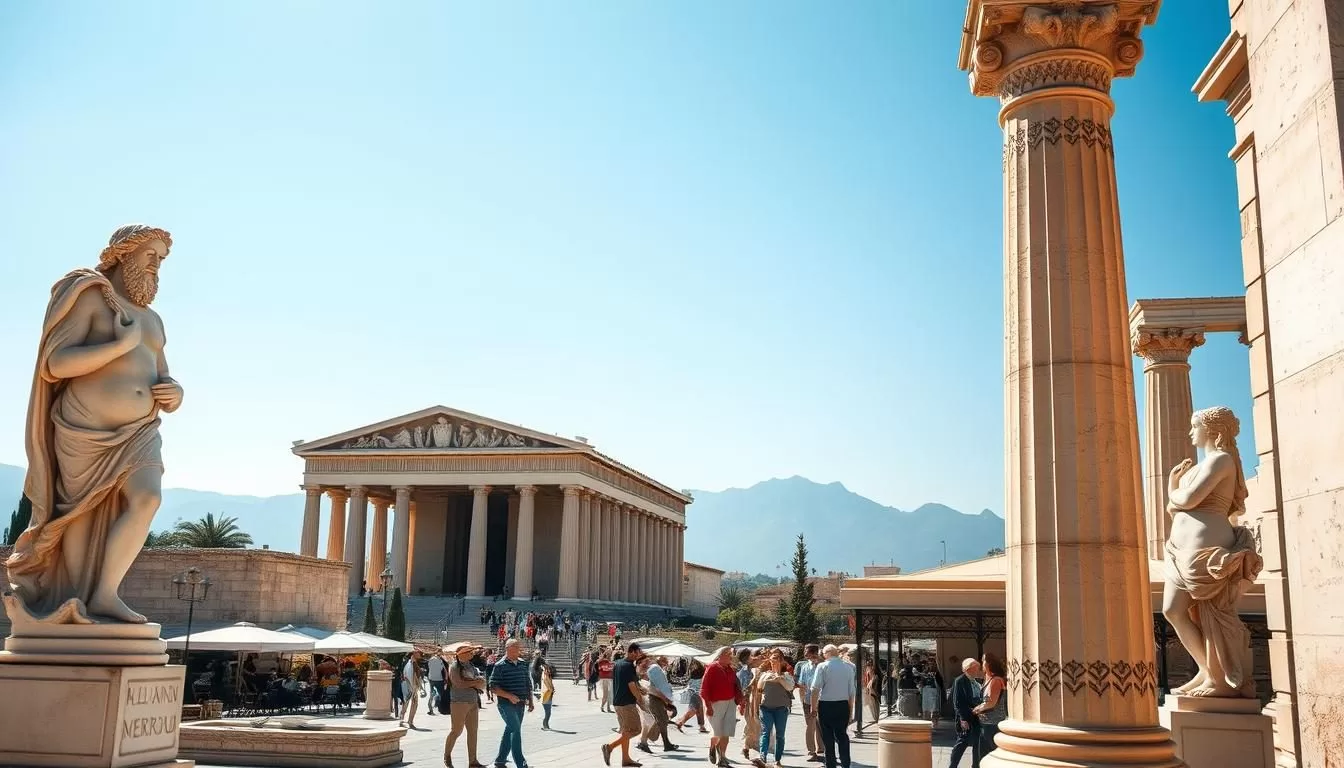✓ Accommodations✓ Flights✓ Rental Cars✓ Tours & Activities ✓ Tours & Activities
When you think of Greece, its rich history and vibrant culture likely come to mind. But did you know that the language plays a central role in shaping its identity? Greek is the official language of the country, spoken by 99.5% of the population. This linguistic unity reflects its deep historical roots and cultural pride.
Modern Greek, a descendant of Ancient Greek, has evolved over centuries. It’s part of the Hellenic branch of Indo-European languages, with its earliest written form dating back to the Minoan civilization. Today, it’s not just a means of communication but a symbol of national heritage.
Beyond the standard form, regional dialects like Cretan and Tsakonian add diversity to the linguistic landscape. These dialects, though less common, are cherished by their speakers and reflect the unique traditions of each region. Understanding this linguistic tapestry gives you a deeper appreciation of Greece’s cultural richness.
Overview of Greece’s Language Landscape
From its ancient roots to modern usage, the Greek language tells a story of resilience. It has evolved over centuries, shaped by historical events and cultural shifts. Today, it remains a cornerstone of national identity and daily life.

Historical Evolution and Cultural Roots
The Greek language traces its origins to Attic Greek, spoken in ancient Athens. Over time, it transformed through the Byzantine and Ottoman periods, absorbing influences from neighboring cultures. This evolution led to the development of regional dialects like Tsakonian, which is still spoken by a small group today.
Historical events played a key role in shaping the language system. The Greek alphabet, for instance, has remained largely unchanged since its creation. This continuity reflects the deep cultural pride tied to the language.
The Role of Language in Greek Society Today
Modern Greek is more than a means of communication; it’s a symbol of unity. In schools, it’s taught as a core subject, ensuring its preservation for future generations. The language also plays a vital role in public discourse, connecting communities across the country.
Regional dialects add diversity to the linguistic landscape. While Modern Greek is the standard form, dialects like Cretan are cherished by their speakers. These variations highlight the rich cultural heritage of different regions.
Language is an essential part of national identity. It influences societal practices, from education to traditions. Understanding its evolution gives you a deeper appreciation of its role in shaping the country’s culture.
Greece: Official and widely spoken languages
Exploring the linguistic diversity of this Mediterranean nation reveals a fascinating blend of tradition and modernity. Modern Greek, the standard form, is spoken by over 11 million people, making it the primary language used in daily life. This system of communication connects communities across the country, preserving its cultural heritage.

Modern Greek and Its Regional Dialects
Modern Greek serves as the foundation of communication today. However, regional dialects like Cretan, Pontic, and Tsakonian add richness to the linguistic landscape. Cretan Greek, for instance, is spoken by around 500,000 people, while Tsakonian has about 1,200 speakers. These dialects, though less common, are cherished by their communities.
Each dialect reflects the unique history of its region. For example, Pontic Greek, spoken by approximately 500,000 people, traces its roots to the Black Sea area. These variations highlight the diversity within the Greek language system.
Language Usage in Everyday Life
In daily life, Modern Greek is the primary language used in schools, media, and public discourse. Schools play a vital role in preserving the standard modern form, ensuring it remains a unifying force. Media outlets also contribute by promoting the language across different platforms.
Regional dialects, though not used in formal settings, are often spoken in local communities. They serve as a living connection to the past, reflecting the cultural identity of their speakers. This balance between tradition and modernity is a key feature of the Greek language today.
| Dialect | Number of Speakers | Region |
|---|---|---|
| Cretan Greek | 500,000 | Crete |
| Pontic Greek | 500,000 | Black Sea Area |
| Tsakonian | 1,200 | Peloponnese |
Understanding these dialects gives you a deeper appreciation of the country’s linguistic and cultural richness. Whether in schools or local communities, the Greek language continues to evolve while honoring its historical roots.
Regional and Minority Language Diversity
Beyond the dominant language, a rich tapestry of minority and regional dialects thrives. These forms of communication reflect the country’s diverse cultural influences and historical migrations. From Albanian to Turkish, each language adds depth to the nation’s linguistic identity.

Albanian, Arvanitika, and Other Balkan Dialects
Albanian is one of the most widely spoken minority languages, with over 443,550 speakers as of 2001. Arvanitika, a dialect of Albanian, is also spoken by smaller communities. These languages highlight the impact of historical migration and cultural exchange in the region.
Other Balkan dialects, like Slavic and Macedonian, are present in border areas. These forms of communication are often passed down through generations, preserving unique cultural traditions.
Turkish, Slavic, and Roma Language Influences
Turkish is another significant minority language, particularly in Western Thrace. It’s spoken by the Muslim community, which includes Pomak and Roma groups. This language enjoys special rights in education, reflecting its historical importance.
Slavic dialects and Romani are also part of the linguistic mosaic. These languages, though less common, are cherished by their speakers and contribute to the region’s cultural richness.
Emerging and Endangered Language Communities
Some dialects, like Yevanic, are on the brink of extinction. This Jewish dialect, once spoken by thousands, now has only a handful of speakers. Efforts to preserve such languages are crucial for maintaining cultural heritage.
Other endangered dialects include Tsakonian and Pontic Greek. These forms of communication face challenges due to declining speaker numbers and modern pressures. Learn more about these efforts on the Languages of Greece page.
Despite these challenges, many communities are working to keep their languages alive. From schools to cultural events, these efforts ensure that minority dialects remain a vital part of the nation’s identity. Discover more about the Greek language and its evolution.
Primary Foreign Languages and Their Influence in Greece Today
In today’s globalized world, foreign languages play a pivotal role in shaping a country’s connectivity and opportunities. In Greece, English dominates as the primary foreign language, spoken by over 48% of the population. This widespread proficiency enhances international business and educational exchanges.

English as the Global Connector in Education and Business
English serves as a bridge between Greece and the global community. It’s the most commonly learned foreign language, with 51% of the population proficient in it. Schools emphasize English as part of the curriculum, preparing students for international opportunities.
In the business sector, English is essential for trade and collaboration. Companies rely on it to communicate with partners worldwide, making it a key skill for professionals. This focus on English strengthens Greece’s position in the global economy.
European Languages: German, French, and Italian in the Curriculum
Beyond English, European languages like German, French, and Italian are also widely taught. German is spoken by 9% of the population, while French and Italian are spoken by 8.5% and 8%, respectively. These languages are integrated into the education system, fostering cultural exchange.
Learning these languages opens doors to diverse career paths and academic opportunities. For example, German is valuable in engineering, while French is often used in diplomacy. This multilingual approach enriches the country’s educational landscape.
Foreign language skills not only enhance personal growth but also contribute to Greece’s multicultural identity. They connect communities and create a vibrant, globally aware society. To learn more about the role of languages in Greece, visit this detailed guide.
Conclusion
Language is the heartbeat of a nation, connecting its past to its present. In this country, the modern Greek form serves as the foundation of communication, uniting communities across different regions. Alongside it, vibrant dialects and minority tongues add depth to the cultural tapestry, reflecting the unique history of each area.
From education to daily interactions, the language system plays a vital role in shaping identity. It bridges generations, ensuring traditions are passed down while adapting to modern needs. Efforts to preserve endangered dialects highlight the importance of linguistic diversity in this ever-evolving world.
As you explore this rich heritage, you’ll see how speakers of various forms contribute to the nation’s unity. Language, in all its forms, remains a powerful force in shaping the future.
The above is subject to change.
Check back often to TRAVEL.COM for the latest travel tips and deals.






